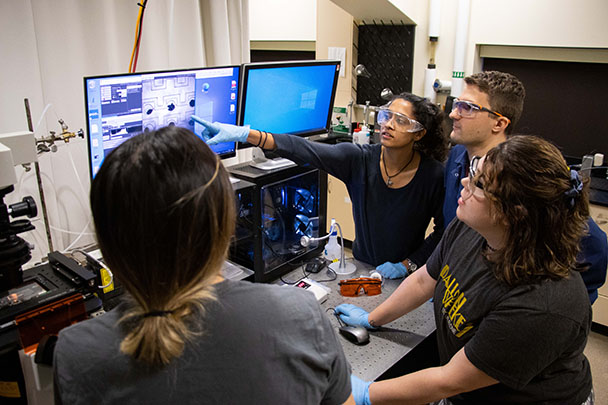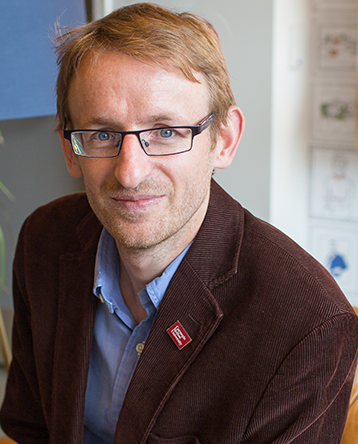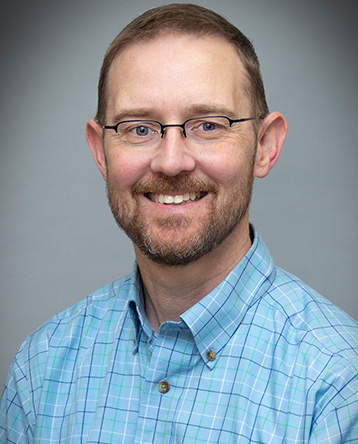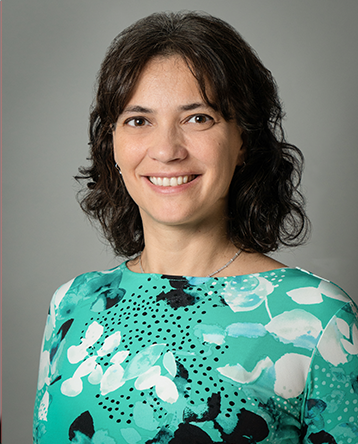At Carnegie Mellon University (CMU), we equip you to use chemical engineering science to solve real-world problems. Learn to use advanced numerical methods, computational fluid mechanics, and process simulation and optimization techniques to develop energy-efficient and sustainable manufacturing processes for new and existing products.
Our industry-relevant curriculum and unparalleled emphasis on computational expertise converge to shape your future. Prepare to meaningfully contribute to a variety of industries or pursue a Ph.D. Choose the degree path that best meets your needs and then customize the curriculum with curated electives.
- Master of Science in Chemical Engineering - Applied Study
- Master of Science in Chemical Engineering
- Master of Chemical Engineering
| Degree | Master of Science - Applied Study |
Master of Science |
Master of Chemical Engineering |
|---|---|---|---|
| Time to degree | 2 years | 1.5 years | 1 year |
| Summer session | Internship | Research | None |
| Coursework | 72 units (about 7 courses) | 72 units (about 7 courses) | 96 units (about 9 courses) |
| Research experience | 2-3 semester independent project | 2-3 semester independent project | Optional research as elective credit |
| Internship | Required | No | No |
Students need to seek their own internships. Enrollment in a master's program does not guarantee an internship. Available resources to help you in your internship search include Carnegie Mellon's Career & Professional Development Center.
Why earn a master's degree in chemical engineering at Carnegie Mellon?
Practical and industry-relevant curriculum
Our master's degree programs provide a deeper understanding of the fundamentals of chemical engineering. Our core curriculum builds on your bachelor's-level engineering or science education, enhancing your problem-solving and mathematical modeling skills. You will have the flexibility to personalize your program with curated electives that match your interests and career goals.
Our programs empower you to model and solve complex scenarios in theoretical contexts and practical applications. View degree requirements.
Work with faculty experts
Our distinguished faculty lead research projects that prepare you for the challenges of the professional world. In your courses, you'll gain insights from their innovative work. Through an independent project or research elective, you can join their team and contribute to their findings.
Current research explorations by chemical engineering faculty include:
- Air quality and climate
- Autonomous and data-driven sciences
- Biotechnology and pharmaceutical engineering
- Catalysis and surface science
- Energy, decarbonization, and sustainability
- Process systems engineering
- Soft materials and complex fluids
A one-of-a-kind computational focus
The MS - Applied Study, MS, and MChE programs have a unique computational emphasis that equips you with cutting-edge skills crucial for tackling complex challenges in chemical engineering. The Department of Chemical Engineering integrates computing throughout the curriculum, readying you for core areas of chemical engineering, such as reactor engineering, process systems, and transport phenomena.
As a CMU chemical engineering graduate student, you can access advanced mathematical modeling and simulation software you can use for coursework and research projects.

Collaborative facilities
Nestled within Doherty Hall, the department's cutting-edge labs and advanced computing facilities stand as hubs of innovation. Conduct research using state-of-the-art instruments and leverage high-performance computing capabilities.
We designed our research labs to encourage collaboration and cross-disciplinary thinking. Unlike traditional closed-room setups, the majority of our labs have open spaces that accommodate multiple research groups. This unique configuration enables interdisciplinary interactions and the seamless exchange of ideas between researchers.
Supportive environment for chemical engineering students
CMU takes pride in fostering a supportive community for graduate students. With half of our student population composed of master's degree and Ph.D. candidates, we understand the unique needs and aspirations that drive advanced academic pursuits.
The Department of Chemical Engineering has a close-knit and collaborative graduate student community. Many students join the Chemical Engineering Graduate Student Association (ChEGSA) and the Chemical Engineering Master's Student Association (ChEMSA), which organize social, academic, and networking events.

"Studying ChemE at Carnegie Mellon gives you the opportunity to learn about a multitude of scientific specializations through research and classes. You may choose to focus on experimental or computational work in disciplines ranging from nanoscience to process engineering. Through cutting-edge research and a supportive culture, you'll engage with people whose ideas and expertise can change the world."
Tim Schwartzkopff, MS, fall 2023
Which chemical engineering master's program should I choose?
Master of Science in Chemical Engineering - Applied Study
The MS in Chemical Engineering - Applied Study provides opportunities for research and work experience that will enable career flexibility in industry as market needs change. Completing the full-time degree program takes two years.
- Independent project: Work with a faculty mentor on an independent project that specializes in one of the subdisciplines of chemical engineering.
- Summer internship: Apply the knowledge from your courses and project work while gaining valuable work experience and growing your industry network. Available resources to help you in your internship search include Carnegie Mellon's Career & Professional Development Center. Enrollment in the program does not guarantee an internship.
Master of Science in Chemical Engineering (MS)
Consider the MS in Chemical Engineering to focus on research and increase your competitiveness for chemical engineering Ph.D. programs or for advanced research roles. Completing the full-time degree program takes one and a half years.
- Independent project: Spend the summer working with a faculty mentor on an independent project that specializes in one of the subdisciplines of chemical engineering.
Master of Chemical Engineering (MChE)
The Master of Chemical Engineering program is a fast track to broaden your knowledge base in the field and advance your technical skills. Completing the coursework-based, full-time degree program takes one year.
Core courses and electives
The MS - Applied Study, MS, and MChE programs share a core curriculum (4 courses) focusing on technical depth in chemical engineering fundamentals and computational skills. Beyond these required courses, you will personalize your master's curriculum with curated electives from within the College of Engineering, such as energy transition technologies or advanced modeling, optimization, and data science.
Meet the Chemical Engineering faculty
Master's students learn from and research with world-class faculty at CMU. Learn more about our professors and their areas of expertise.
Careers and outcomes for chemical engineering students
The Department of Chemical Engineering's unrivaled computational focus allows you to learn pioneering techniques already revolutionizing the fields of materials and chemical discovery, among others. This unique feature is one of the reasons our graduates are some of the most sought-after candidates in both industry and academia. In fact, 92% of CMU engineering master's students who graduated in 2023 and 2024 have found jobs or are continuing their education.
Chemical engineering master's degree graduates go on to pursue doctoral degrees at universities such as:
- Georgia Institute of Technology
- Imperial College London
- Iowa State University
- Purdue University
- RWTH Aachen University
- University of Texas at Austin
- University of Illinois Urbana-Champaign
CMU chemical engineering graduates go on to work at companies such as:
- Amgen
- Deloitte
- ExxonMobil
- Intel
- Merck
- P&G
- PPG
- Samsung
- Sanofi
- Unilever
Recent job titles for our graduates include:
- Advanced process control and machine learning engineer
- Battery modeling engineer
- Data scientist
- Global strategic sourcing analyst
- Process engineer
- Product development chemist
- R&D scientist
- Research engineer
Mean salary*: $93,604
*Based on survey results from program graduates
See post-graduation salaries and destination information for recent CMU Chemical Engineering graduates.
Admissions and application deadlines
The master's programs are designed for engineering or science students interested in focusing on the highly versatile core expertise of chemical engineering. Prospective students must have earned a bachelor's degree in chemical engineering or a related discipline.
We accept applications and enrollment for both fall and spring semesters.
- Fall term of entry deadline: January 31
- Spring term of entry deadline: September 1
Take the next step
Gain practical expertise with the Department of Chemical Engineering's emphasis on computational skills and collaborative research. Earn a Master of Science - Applied Study, Master of Science, or Master of Chemical Engineering from Carnegie Mellon University and unlock the power to revolutionize industries, pioneer sustainable solutions, and make a lasting impact on the world.



